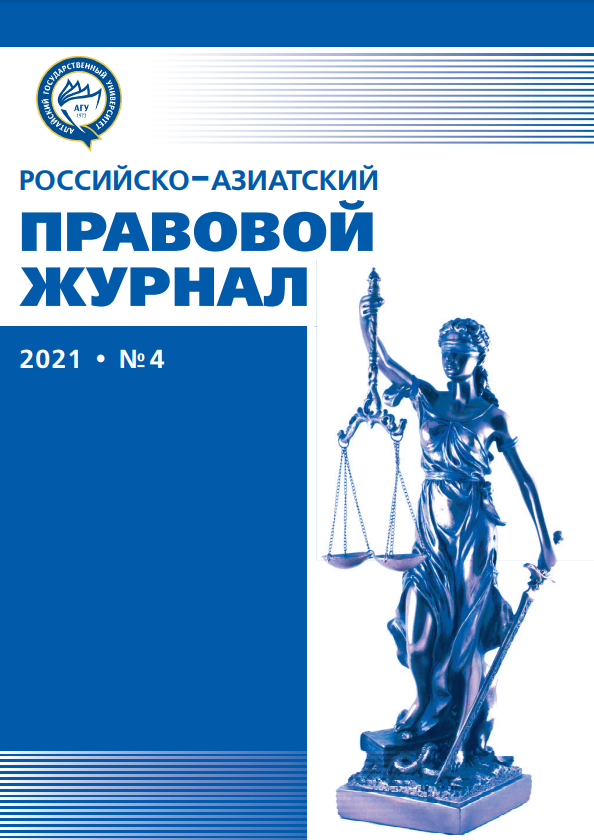THE DOCTRINE OF “REMOVING THE CORPORATE VEIL”: A COMPARATIVE LEGAL ANALYSIS OF THE LEGISLATION AND JUDICIAL PRACTICE OF RUSSIA AND SOME ASIAN COUNTRIES
УДК 347.72.032 ББК 67.404.013
Abstract
In this article, the authors aimed to give a comparative legal analysis of the doctrine of “removing thecorporate veil” in the context of legislation and judicial practice of the Russian Federation and some Asiancountries (People’s Republic of China, Indian Republic). In the process of studying this problem, it wasconcluded that there are similar norms in foreign legislation with Russian ones on the prohibition of usingthe legal status of a company for the purpose of abuse of law, on the prohibition of affiliation, as well as adiscussion rule on the full joint and several liability of the sole founder of a limited liability company. Inaddition, the conclusion is made about the increasing use of this doctrine in the country of an atypical legalfamily for it — the People’s Republic of China. Based on the materials of the judicial practice of the Republicof India, an attempt has been made to classify this doctrine according to the criterion of the purpose of abuse:in the case of a limited approach, the responsibility of the controlling persons is assigned in the case of theinitially fictitious purpose of creating a legal entity, and in the case of an unlimited approach — for any unfairaction using the limited liability structure of the founder (participant) of the company for its debts.
Downloads
References
Концепция развития гражданского законодательства Российской Федерации (одобрена Советом при Президенте РФ по кодификации и совершенствованию гражданского законодательства 7 октября 2009 г.) // Вестник Высшего Арбитражного Суда Российской Федерации, 2009. N 11.
Шишмарева Е.С. Доктрина «снятия корпоративной вуали» в зарубежных странах и в России: магистерская диссертация. Красноярск, 2019.
Постановление Президиума ВАС РФ от 24.04.2012 N 16404/11 по делу N А40–21127/11–98–184.
Решение Окружного суда Восточного округа Висконсина по делу U. S. v. Milwaukee Refrigerator Transit Co., P. 142 F. 247 (E.D. Wis. 1905).
Закон КНР «О компаниях» (People’s Republic of China Company Law) GH IP&Legal, URL: http://ghiplegal.com/static/frontend/img/pdf/company_law_en.pdf (дата обращения: 18.11.2021).
Галихайдаров Е.В. Применение доктрины «Piercing the corporate veil» в гражданском праве Китайской Народной Республики (Ч. 1: Анализ законодательства) // Арбитражный и гражданский процесс. 2010. №2.
Стрелкова И.И. Законодательство Китая о банкротстве: основные этапы эволюции //Юридические исследования. 2017. №1. С. 75–90.
Yu K.B., & Krever R. (2015). The High Frequency of Piercing the Corporate Veil in China //Asia Pacific Law Review, 23 (2). P. 63–87.
Закон Индии «О компаниях» 2013 г. (Companies Act 2013) Ministry of Corporate Affairs: Government of India. URL: http://ebook.mca.gov.in/default.aspx?page=main (дата обращения: 18.11.2021).
Juggi Lal Kamlapat vs Commissioner Of Income-Tax, U. P. on 4 September, 1968, point 13. Indian Kanoon. URL: https://indiankanoon.org/doc/1976113/ (дата обращения: 18.11.2021).
Russian-Asian Law Journal is a golden publisher, as we allow self-archiving, but most importantly we are fully transparent about your rights.
Authors may present and discuss their findings ahead of publication: at scientific conferences, on preprint servers, in public databases, and in blogs, wikis, tweets, and other informal communication channels.
Russian-Asian Law Journal allows authors to deposit manuscripts (currently under review or those for intended submission) in non-commercial, pre-print servers such as ArXiv.
Authors who publish with this journal agree to the following terms:
- Authors retain copyright and grant the journal right of first publication with the work simultaneously licensed under a Creative Commons Attribution License that allows others to share the work with an acknowledgement of the work's authorship and initial publication in this journal.
- Authors are able to enter into separate, additional contractual arrangements for the non-exclusive distribution of the journal's published version of the work (e.g., post it to an institutional repository or publish it in a book), with an acknowledgement of its initial publication in this journal.
- Authors are permitted and encouraged to post their work online (e.g., in institutional repositories or on their website) prior to and during the submission process, as it can lead to productive exchanges, as well as earlier and greater citation of published work (See The Effect of Open Access).








